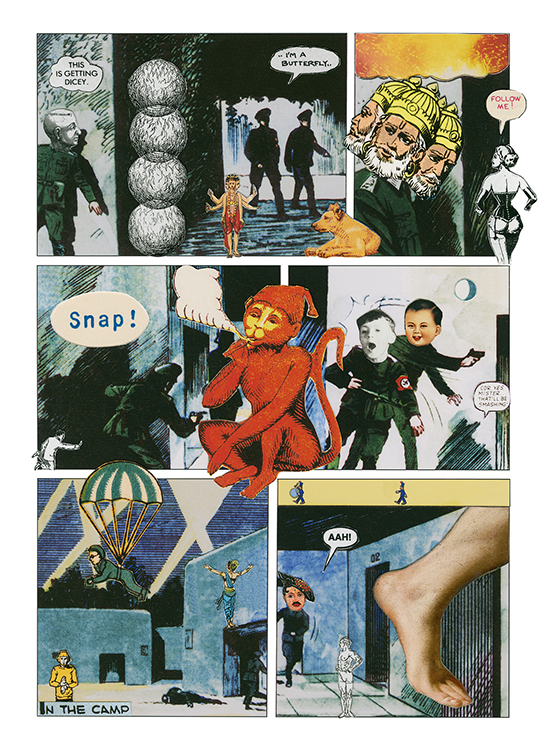REVIEW BY RYAN MIHALY
Odyssey Bookshop (South Hadley, MA)
Rowdy, cacophonous, and totally messed-up, Here Comes Kitty: A Comic Opera is a graphic tale that takes the shape of a comic book but wonderfully subverts the form. Using Kaptain Kloss, a Polish comic book from 1971, as a backdrop, Richard Kraft’s collage narrative summons hundreds of characters (animals, religious figures, Nazi soldiers, choir boys, a giant cherub that always seems to be falling on its rump) to the playing field—literally an open space for free association, interpretation, and play. What unfolds is a plotless opera that is, in every sense of the word, hysterical.
In Here Comes Kitty, what is often split into binaries are together at play: order and chaos, reality and dream, sense and nonsense. Containing a dense mix of recognizable real-life figures and imaginary characters, the book feels simultaneously familiar and nightmarishly foreign. The key here is to not stare too hard. A single image—like a blue Margaret Thatcher caught in a maniacal grin pasted onto a soldier’s body, or a man who looks like he just passed gas standing atop a geyser screaming “Goaaaaaaalll!”—is enough to send you into a fit of laughter.
Along with this soccer field exclamation, the book is filled to the brim with language at play. In a way, Here Comes Kitty feels like a compendium of English-language dialects. We hear (this is an opera, after all) the macho slang of soldiers, juvenile cussing, puerile gags and one-liners, babies’ first words, onomatopoeias, poetic rumination, and nonsense, like the barbaric yawp that opens the book: “EEOEOOOOEEEEEOOOOEO.”
Interpolating the comic narrative are Danielle Dutton’s prose poems, which weave another madcap tale into the opera. The poems riff off Kraft’s collages and add more characters to the fray, none more mysterious than the elusive Mania, the “girl with the face of a lonesome man.” The poems are highly associative, highly visual; because of their mesmeric logic, the opera swells to a fever pitch.
Despite all the visual and textual free play, there is much to be read into. An erudite conversation between Richard Kraft and poet and Ann Lauterbach, included at the end of the book, reveals much of Kraft’s influence—Australian Aboriginal songlines, Indian miniature paintings, the Bible, his experience as a child in a boys’ choir, to name only a few—and encourages looking at the book with new interpretive lenses.
The conversation is magnificent, because it asks us to stop dismissing art that appears to be meaningless and encourages us to take up our critical tools and mine for meanings. Don’t let pure rationality take over; don’t let unbridled visions have complete control either—if you let the two work in harmony, the imaginative nuances and mythical subtexts of art will smoothly open outward toward you.
But don’t forget that Here Comes Kitty is raunchy like an NC-17 movie and crazy like recess gone awry.
Here Comes Kitty: A Comic Opera (with interpolations by Danielle Dutton and a conversation with Ann Lauterbach) is published by Siglio Press and distributed by D.A.P./Artbook.




